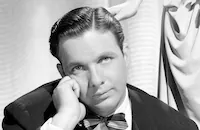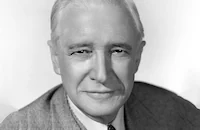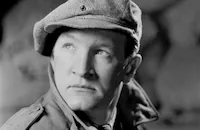The Singing Sheriff
Cast & Crew
Leslie Goodwins
Bob Crosby
Fay Mckenzie
Fuzzy Knight
Iris Adrian
Samuel S. Hinds
Film Details
Technical Specs

Synopsis
In Elbow Bend, Arizona, the last of the old frontier towns, Sheriff Seth Masters and his deputy, Fuzzy, enter the saloon and approach the leader of the local outlaws, Squint, about the recent robbery and disappearance of rancher Charlie Weston. While they talk, one of Squint's henchmen, hidden behind a door and peering through a peephole, shoots and seriously wounds Seth, spurring the sheriff to send for his son, Rockingham "Rocky" Masters from the city. When Rocky, who calls himself Butch and works for Bob Richards, a singer billed as the Singing Sheriff, receives a telegram asking him to come home, he reveals to Bob that he left his family years earlier, has told them for the past ten years that he is the Singing Sheriff, and now is afraid to disappoint them. Bob agrees to pose as "Rocky, the Singing Sheriff," and briefly visit his dying father for him. When he reaches Arizona, however, he is shocked to discover that the townspeople are assuming he is a sharp-shooting East Coast sheriff who will rid their town of crime. He is more pleasantly surprised to meet his "sister," the beautiful Caroline, and actively discourages her suitor, lawyer Martin Vance. After greeting his recovering "father," Bob visits the saloon in his Singing Sheriff costume to confront Squint, assuring Fuzzy that he only appears terrified in order to fool the outlaws. Bob sings a song, at the end of which he accidentally shoots his gun through the peephole, behind which Squint's henchman is aiming his gun at him. At the next day's annual barbeque, Bob tries to confess his real identity to Caroline, just as Squint's men begin a shootout. Bob disappears, and although everyone believes that he is chasing the outlaws, he actually runs home to pack his bag and write Caroline a letter professing his non-brotherly love. He races to the bus station, where he inadvertently foils a robbery by Squint's men, who had shot up the barbeque merely to distract the law from the real crime. After the thieves are arrested, Bob discovers the bus is a day late, and so sneaks back to the house, where Caroline has found his note and now despises him. On a hunch, Bob hides in Vance's office the next day, overhears him and Squint discuss their murder of Charlie, and then steals Charlie's lucky charm out of Vance's safe. That night, he traps Squint and arrests him, then lies to Vance that he has found Charlie's body to use as evidence against Squint, knowing Vance will send his men to double-check the gravesite. Bob has Fuzzy follow them and gain proof of the murder, and at the trial, when Squint accuses Vance of planning the crime, Bob corraborates his testimony with the lucky charm. Vance runs from the courtroom, only to be stopped outside by Butch, who is reintroduced to his family and named sheriff as Bob and Caroline embrace.

Director
Leslie Goodwins
Cast

Bob Crosby

Fay Mckenzie

Fuzzy Knight

Iris Adrian

Samuel S. Hinds

Edward Norris
Andrew Tombes

Joe Sawyer

Walter Sande
Doodles Weaver
Pat Starling
Louis Da Pron
Spade Cooley
Deuce Spriggins
Max Wagner
Pierce Lyden
Ethan Laidlaw
Rex Lease
Ben Pitti
Art Fowler
Jimmy O'gatty
Jimmy Lucas
Bob Mckenzie
Frank Larue
William Sloan
Syd Saylor
Jean Trent
Ronnie Rondell
Donald Kerr
Bob Benton
Crew
Henry Blankfort
Bernard B. Brown
Bernard W. Burton
Richard Coburn
Eugene Conrad
Edward Curtiss
Dave Franklin
Sam Freed Jr.
Russell A. Gausman
John B. Goodman
John Grey
Abraham Grossman
William Hedgcock
William Holland
Inez James
William Lava
Sidney Miller
Robert Pritchard
Vincent Rose
John Schonberger
Milton Schwarzwald
Leigh Smith
Henry Troy
Charles Van Enger
Vera West
Wava White
Virginia Wicks
"sneeze" Williams

Film Details
Technical Specs

Quotes
Trivia
Notes
According to a March 1944 Hollywood Reporter news item, Edward Lilley was originally scheduled to direct the film. An April 1944 Hollywood Reporter item identifies Spade Cooley's orchestra as The Western Dance Gang. Although the film's credits list Robert Pritchard as sound technician, the Production Encyclopedia lists William Hedgcock in this position.












